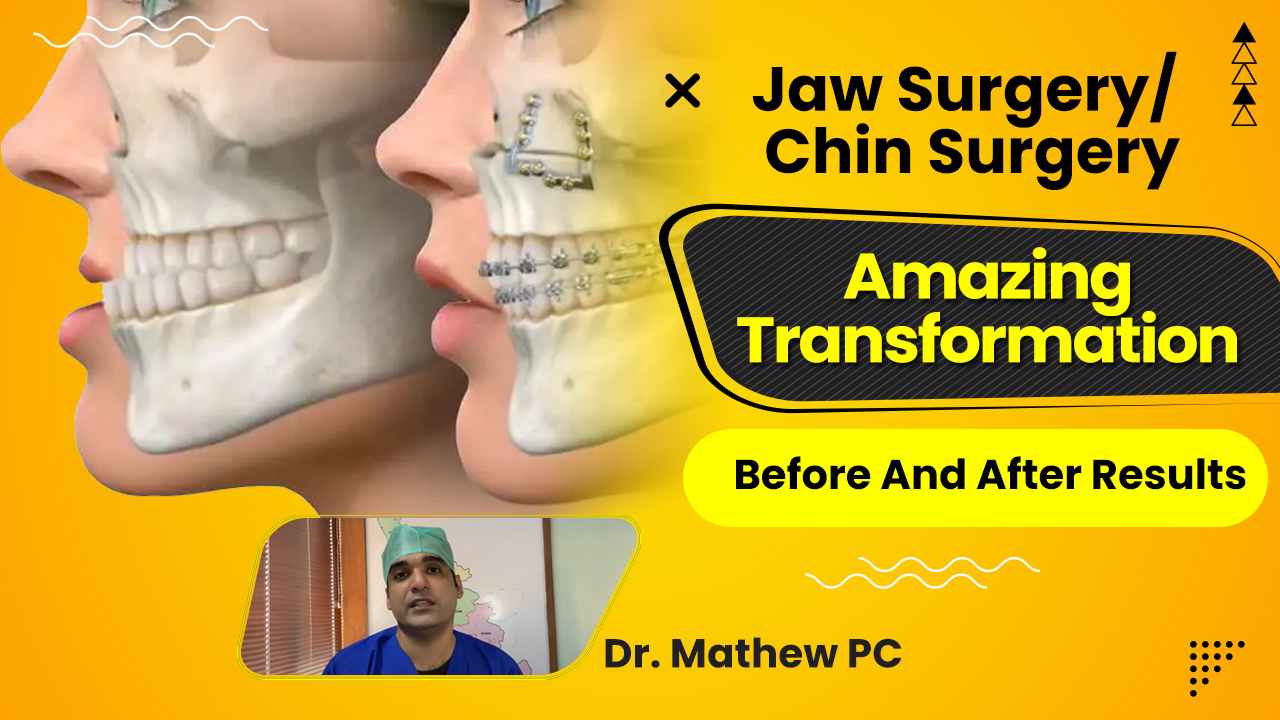Jaw Surgery in Kerala 2024 | Less Jaw Surgery Recovery Time | Dr Mathew PC
Jaw surgery in Kerala: Detailed types, success rates, and jaw surgery recovery time tips.

Corrective jaw surgery, or orthognathic surgery, is a transformative procedure aimed at correcting jaw misalignments such as open bite, underbite, and overbite. This surgery, particularly popular in Kerala, addresses both functional and aesthetic concerns. The jaw surgery recovery time typically extends up to 12 weeks, during which patients experience significant improvements in jaw function and facial appearance. Understanding the types of surgeries available, their success rates, and patient experiences can help potential patients make informed decisions.
Free Online Consultation - Contact us at +918330077198
Types of Jaw Surgeries Offered in Kerala
-
Maxillary Osteotomy (Upper Jaw Surgery)
- Purpose: This surgery corrects issues like a receding upper jaw, crossbite, or open bite. It involves repositioning the upper jaw to align it correctly with the lower jaw.
- Procedure: The maxilla (upper jaw) is cut and repositioned during the surgery. Plates and screws hold the bone in its new position, allowing it to heal in the corrected alignment.
- Recovery: The recovery phase includes managing swelling and adhering to a soft diet. This procedure's jaw surgery recovery time is typically around 8-12 weeks.
-
Mandibular Osteotomy (Lower Jaw Surgery)
- Purpose: This surgery corrects a receding or protruding lower jaw (mandible). It improves bite function and facial aesthetics by moving the lower jaw into a more natural position.
- Procedure: The lower jaw is cut, and the bone is moved either forward or backward as needed. It is then secured with plates and screws.
- Recovery: Patients can expect similar recovery times to maxillary osteotomy, with a gradual return to normal activities within 6-12 weeks.
-
Genioplasty (Chin Surgery)
- Purpose: Genioplasty is performed to enhance the chin’s shape, either by augmenting a weak chin or reducing an overly prominent one. It is often done in conjunction with other jaw surgeries to achieve facial balance.
- Procedure: The chin bone is cut and repositioned or reshaped. In some cases, implants may be used to achieve the desired outcome.
- Recovery: The jaw surgery recovery time for genioplasty is shorter, typically 4-6 weeks, as it is less invasive than other jaw surgeries.
-
Bimaxillary Osteotomy
- Purpose: This comprehensive procedure involves both the upper and lower jaws and is used to correct complex jaw misalignments, such as severe underbite or overbite.
- Procedure: The surgeon performs osteotomies on both the upper and lower jaws to reposition them for optimal alignment. This procedure significantly improves both function and aesthetics.
- Recovery: Due to its complexity, the recovery time can be longer, ranging from 12 weeks to several months, depending on the extent of the surgery.
Success Rates of Jaw Surgery in Kerala
Jaw surgeries, particularly those performed by experienced surgeons like Dr. Mathew PC in Kerala, have high success rates. These surgeries are highly specialized, with success largely dependent on precise surgical technique, careful planning, and adherence to post-operative care.
- Functional Improvement: Over 90% of patients report significant improvement in jaw function, including better chewing, speaking, and breathing.
- Aesthetic Enhancement: The aesthetic outcomes are also favourable, with the majority of patients experiencing enhanced facial symmetry and improved self-confidence.
- Patient Satisfaction: Patient satisfaction rates are typically high, with most patients expressing that the surgery met or exceeded their expectations.
Patient Testimonials and Case Studies
-
Ravi's Experience with Mandibular Osteotomy Ravi, a 25-year-old from Kerala, suffered from a severe underbite that affected both his appearance and ability to chew food properly. After undergoing a mandibular osteotomy performed by Dr. Mathew PC, Ravi's jaw alignment was corrected, significantly improving his quality of life. "The first few weeks were challenging, but the results were worth it. I can now eat comfortably, and I’m much more confident about my appearance," says Ravi.
-
Anita's Journey with Bimaxillary Osteotomy Anita, a 30-year-old teacher, had struggled with a protruding lower jaw and speech impediments since childhood. Her decision to undergo bimaxillary osteotomy changed her life. "The surgery was extensive, but Dr. Mathew's expertise made all the difference. The recovery was long, but seeing my new smile and feeling the ease in speaking was an incredible reward," Anita shares.
-
Suresh's Genioplasty Success Suresh, 28, opted for genioplasty to address a receding chin that had always made him self-conscious. "The surgery was relatively quick, and the recovery was smooth. The change in my facial profile is subtle but makes a huge difference in how I see myself," Suresh explains. His recovery time was just under six weeks, and he was thrilled with the results.
Preparing for Jaw Surgery in Kerala
Preparation is key to a successful jaw surgery outcome. In Kerala, Dr Mathew PC and his team offer comprehensive pre-surgical consultations, including virtual surgical planning, detailed X-rays, and 3D models to ensure precision.
- Orthodontic Preparation: Many patients require orthodontic treatment before surgery to align the teeth properly. This pre-surgical phase can last 12-18 months.
- Patient Education: Understanding the entire process, including the potential risks and the expected jaw surgery recovery time, is essential. Dr. Mathew emphasizes patient education, ensuring that each individual is fully informed and prepared.
Recovery Tips for Jaw Surgery Patients in Kerala
Recovery from jaw surgery requires patience and careful adherence to your surgeon’s guidelines.
- Dietary Adjustments: Stick to a soft or liquid diet for the first few weeks to avoid putting strain on the jaw. Gradually introduce more solid foods as healing progresses.
- Pain Management: Pain and swelling are common but can be managed with prescribed medications. Cold compresses can also help reduce swelling.
- Activity Restrictions: Avoid strenuous activities that could impact the jaw. Light walking and gentle movements are encouraged to keep the body active without risking the surgical site.
- Follow-Up Care: Regular check-ups with your surgeon in Kerala are crucial to monitor healing and adjust your recovery plan.
Advanced Orthognathic Procedures for Complex Jaw Issues in Kerala
For those considering advanced orthognathic procedures in Kerala to address complex jaw issues such as a severe underbite or jaw asymmetry, Dr. Mathew PC offers cutting-edge surgical options. These procedures improve functionality and enhance facial aesthetics, providing patients with life-changing results. With a focus on personalized care and precision, these advanced surgeries are tailored to meet each patient's unique needs, ensuring both safety and effectiveness.
Conclusion
Choosing to undergo jaw surgery in Kerala with Dr. Mathew PC offers patients a pathway to improved jaw function, enhanced facial aesthetics, and increased confidence. Understanding the types of jaw surgeries, the associated jaw surgery recovery time and the experiences of others who have undergone similar procedures can help you make an informed decision. With the right care and a structured recovery plan, you can expect to achieve excellent results and a smooth recovery journey.
Also read, https://drmathewpc.com/blog/4, https://drmathewpc.com/blog/5, https://drmathewpc.com/blog/9


